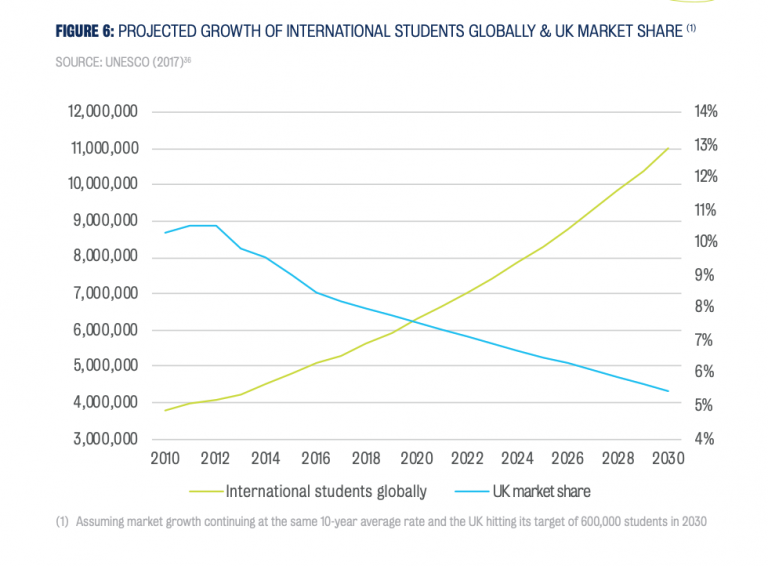The UK’s former universities minister, Jo Johnson, has recommended doubling the duration of the post-study work visa from two to four years among a range of measures that would help the UK higher education sector overcome the shocks of Covid-19 and Brexit.
He also wants the UK to double the number of Indian students the country attracts by 2024.
In a report published by the Policy Institute at King’s College London and the Harvard Kennedy School, Johnson warned that the anticipated 50-75% drop in international students as a result of coronavirus would expose “real vulnerabilities” in university finances.
The brother of prime minister Boris Johnson said universities have long been tied down by “bureaucracy, obsessions with poorly-crafted immigration targets and petty rules”, pointing out that the UK’s international student numbers rose by just 0.3% in 2016 and 0.9% in 2017.
To overcome this, Johnson recommends that the government recommit to existing 2030 exports targets outlined in the International Education Strategy – and create an additional goal for the UK to be the number one study destination worldwide after the US.
“For many years, the top three destinations for international students have been the United States, the United Kingdom and Australia. But recently global student mobility has begun to shift,” he wrote in the report.
“The UK’s market share declined in 17 out of the world’s 21 top sending countries between 2010 and 2017.
“By contrast, Australia has now seen steady year-on-year growth of around 14% and might soon catch up with the UK in terms of total overseas numbers if it has not done so already.”

Source: Universities open to the world report
To maintain its foothold as a top student destination, Johnson said that it is vital to send a clear signal that Britain is open and welcome, with a “best-in-class student visa offer”.
To achieve this, he said, the government should “turbocharge” the competitiveness of the UK visa offer with the doubling of post-study work visas from two to four years.
He also suggested that the UK should seek to rebalance its mix of international students coming by doubling Indian student numbers by 2024.
Johnson acknowledged that the UK has made strides in appealing to Indian students after a steep decline following the removal of the PSW visa in 2012.
The government should take heed of the fact that the number of Tier 4 study visas for Indian students increased 136% to almost 50,000 in the year to March 2020, he counselled.
He added that reversing the Home Office’s “continued and deeply unpopular” exclusion of India from its low-risk Tier 4 visa list – which allows students from China and certain other countries a streamlined visa process – should also be a priority.
“The UK is in a good position to take market share from the US in India and a further improvement in the post-study work offer would help the sector overcome new concerns about studying in the UK that have arisen in the wake of Covid-19,” he said.
“A Tier 4 visa that promises four years of post-study work rights will be of huge advantage to the UK in India, where students are particularly sensitive to this opportunity.”
Among his other recommendations, Johnson – who was appointed chairman of the advisory board to ApplyBoard in February – also wants to re-focus the British Council on education promotion and build a StudyUK alumni network to “leverage its international alumni”.
“International education is one of the UK’s few globally competitive sectors,” said Johnson in a statement.
“The moment has come to ensure that the UK’s great universities can play their full part in this next chapter of Britain’s engagement with the world beyond its shores.”
When asked if the UK was too reliant on China, in an interview with BBC Radio 4, he commented that beyond a focus on India, “I recommend we increase significantly the number of students from other key countries such as Nigeria and Malaysia to rebalance the mix.”
Asked if brother Boris was receptive to Johnson’s agenda, he replied, “He’s a strong supporter of international students and always has been.
“He’s got the report. He’s received it. And, you know, I’m sure he’ll be getting round to reading it as and when he has a chance.”
Laura Rettie, vice president of global communications at education consultancy Studee commented: “Brexit and now the pandemic has been the perfect storm, plunging many [universities] to the brink of collapse.
“The government must offer support to keep them afloat – time is of the essence as UK universities slide further down the rankings.”




